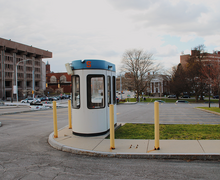Maxwell hosts talk with SU alum regarding worker inequities during pandemic
Cassandra Roshu | Asst. Photo Editor
Syracuse University alumnus Jamie McCallum interviewed frontline and essential workers at the height of the pandemic to a better perspective of the economic consequences from COVID-19. McCallum discussed stories from workers through the economic devastation and uncertainty in his new book.
Get the latest Syracuse news delivered right to your inbox.
Subscribe to our newsletter here.
During the height of the COVID-19 pandemic, Syracuse University alumnus Jamie McCallum held 700 surveys and 100 in-depth interviews with frontline and essential workers to share workforce stories through the economic devastation and uncertainty.
Now, after launching the book he crafted from those stories, “Essential: How the Pandemic Transformed the Long Fight for Worker Justice,” McCallum shared his process during a Monday discussion, hosted at the Maxwell School of Citizenship and Public Affairs.
McCallum, also an associate professor of sociology at Middlebury College, said his research highlighted economic inequities brought to light during the pandemic. After previously writing two books on unions and the workforce, he said he used his new book to trace the origins of American labor unrest through the lens of the pandemic.
After former Gov. Andrew Cuomo and other state leaders extended restrictions and closures in April 2020, McCallum began to interview workers in New York state. Those limitations allowed some industries, like education, to transition online. Other industries, like healthcare and truck driving, had to remain in person, creating distinction among working Americans.
McCallum shared stories from individual workers he interviewed in frontline industries, including healthcare, education, manufacturing and retail. He said he found that the work people did and the demand on them during the pandemic is a stark reflection of class relations in the U.S.
“If you risked your life to go to work, you were in a pandemic working class, (and) if you didn’t, you weren’t,” McCallum said.
Despite the health risks, McCallum called the level of advocacy through strikes among workers in 2020 “insane,” especially from those who weren’t registered in a union.
“An injury to one is an injury to all,” McCallum said. “We’re all better off if we’re all better off. Those things are true always, but they’re especially true during the pandemic.”
McCallum emphasized that unions did help to reduce the spread of COVID-19 and limit deaths during the pandemic, especially in unionized nursing homes. Union nursing home workers were 11% less likely to die of COVID-19 compared to 8% for non-union nursing homes, McCallum added.
“You get a situation where the basis to provide care is increasingly being undermined by the system that care workers help prop up,” McCallum said.
Workers across New York state continue to demonstrate in support of better working conditions. At SU, graduate workers are advocating for improved working conditions, pay, hours and benefits through the Syracuse Graduate Employees United unionization effort.
McCallum emphasized that workers’ efforts to demand better working conditions went mostly unnoticed during the height of the pandemic, but added that his perspective changed when he talked to workers directly.
“All these little things began to bubble up, and that fell completely under the radar of official statistics,” McCallum said. “There was no labor unrest until you began talking to people, and so those stories form the book.”
Published on February 28, 2023 at 1:42 am
Contact Dominic: dcchiapp@syr.edu | @DominicChiappo2






